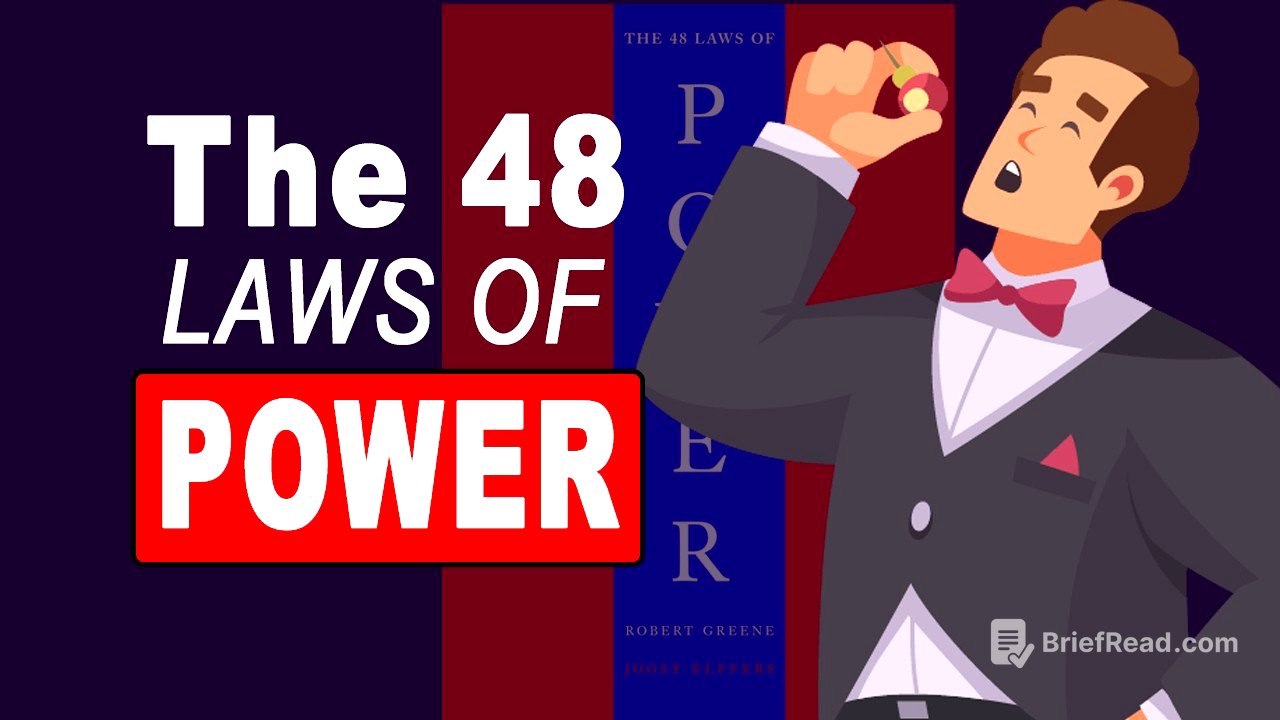TLDR;
This video summarizes Robert Greene's "48 Laws of Power," offering a tactical guide to acquiring, maintaining, and defending against power. It uses historical examples, reflective questions, and exercises to illustrate each law, divided into six categories for focused learning. The laws cover topics such as mastering superiors, managing enemies, concealing intentions, controlling speech, cultivating reputation, using deception, and understanding human nature.
- Never Outshine the Master
- Never Put Too Much Trust in Friends
- Conceal Your Intentions
- Say Less Than Necessary
- So Much Depends on Reputation
- Court Attention at All Costs
Introduction [0:00]
Robert Greene's "48 Laws of Power" is presented as a tactical and insightful guide on power dynamics, detailing how to acquire, maintain, and defend against power. The video introduces Greene's masterpiece, highlighting its exploration of the hidden rules of power that shape the world. It aims to assist viewers in their journey to understand and wield power effectively. The video also mentions a complete blueprint of the 48 Laws of Power, filled with historical anecdotes, reflective questions, and exercises to aid in the application of each law, along with detailed mind maps divided into six categories for focused learning.
Law 1 [0:43]
Law 1, "Never Outshine the Master," is illustrated through the story of Nicola Fouquet, a 17th-century French finance minister who lost favor by hosting a lavish party that overshadowed King Louis XIV. In contrast, Galileo Galilei strategically dedicated his discovery of Jupiter's moons to the Medici family, securing a prestigious position and financial stability. The law advises making superiors feel secure by complimenting them, seeking their advice, and allowing them to take credit. It cautions against flaunting intelligence if it makes the boss insecure. However, it notes that if the boss is weak or fading, subtly outperforming them may be necessary to position oneself as the natural successor.
Law 2 [3:31]
Law 2, "Never Put Too Much Trust in Friends," warns against over-reliance on friends, citing the example of Byzantine Emperor Michael III, who was betrayed and murdered by his trusted friend Basil. Enemies, being more predictable, can be managed effectively. Emperor Taizu of the Song Dynasty avoided a bloody coup by offering his general colleagues pensions instead of executing them. The law suggests that enemies turned allies are often more reliable due to their need to prove loyalty. It advises caution with friends, as familiarity can breed resentment, and suggests using enemies for strategic advantage, as they provide focus and a clear target.
Law 3 [7:32]
Law 3, "Conceal Your Intentions," is exemplified by Otto von Bismarck, who hid his true intentions regarding war with Austria to strengthen Prussia's military. By feigning opposition to war, Bismarck gained time and misled his opponents. The law advises using misdirection to control what others know, speaking openly about false ambitions, and creating smokescreens with irrelevant details. Appearing weak or harmless can also be a perfect smokescreen, diverting attention from one's true goals.
Law 4 [10:22]
Law 4, "Say Less Than Necessary," highlights Louis XIV's mastery of controlled speech, which created mystery and authority. Speaking less maintains control, prevents manipulation, and avoids revealing weaknesses. Silence makes others uncomfortable, prompting them to reveal more than intended. Words, once spoken, cannot be taken back, and sarcasm can damage relationships. Speaking less makes one seem more impressive and wise, forcing others to consider their words carefully. Roman military hero Cory Alannis was exiled from Rome because he couldn't control his words.
Law 5 [13:06]
Law 5, "So Much Depends on Reputation," uses the example of Cesare Borgia, whose fearsome reputation intimidated enemies and acted as a shield. A strong reputation is a powerful asset, inviting respect and fear, but once damaged, one becomes vulnerable. The law advises building a reputation on a single, outstanding quality and strategically protecting it. Tactics include not appearing desperate, spreading rumors about rivals subtly, avoiding excessive aggression, and using humor or gentle mockery. If a reputation is tarnished, aligning with respected figures can help reshape it.
Law 6 [16:34]
Law 6, "Court Attention at All Costs," is illustrated by Thomas Edison, who staged public demonstrations and made bold claims to capture public attention. Edison's mastery of attention overshadowed his rival Nikola Tesla, proving that in the game of perception, power often trumps reality. The law advises becoming a magnet for attention by attaching one's name to the sensational and scandalous, continuously reinventing oneself, creating an air of mystery, and appearing larger than life. Controversy fuels attention, and it's better to be attacked than ignored.
Law 7 [20:04]
Law 7, "Get Others to Do the Work for You, But Always Take the Credit," uses Thomas Edison, who took credit for others' work, including that of Nikola Tesla. The world rewards visibility, not effort. The law advises against doing what others can do for you, as it leads to exhaustion. It suggests using people with skills you lack, standing on the shoulders of giants by borrowing and improving existing ideas, and strategically sharing credit to maintain influence.
Law 8 [22:32]
Law 8, "Make Other People Come To You – Use Bait If Necessary," is exemplified by Tokugawa Ieyasu, who waited for his enemies to make the first move, weakening them from within through planted spies and false rumors. Instead of chasing opportunities or enemies, set the stage and lure them into action, controlling the game. Make others react, create temptations they cannot resist, and control the battlefield by maneuvering them to your chosen ground. Exploit their weaknesses and master your emotions to manipulate them effectively.
Law 9 [25:35]
Law 9, "Win Through Your Actions, Never Through Argument," is illustrated by Galileo, who showed evidence through his telescope rather than arguing with the Church. Winning an argument may feel good, but it creates lasting resentment. Truth is generally seen, not heard. Instead of proving a point, demonstrate results. Victor Lustig, a con artist, used manufactured ignorance to deflect blame and offer a false solution, winning the psychological battle.
Law 10 [27:46]
Law 10, "Infection: Avoid the Unhappy and Unlucky," warns against associating with those who spread misery, using the example of Lola Montez, whose presence brought chaos to King Ludwig of Bavaria. Emotions and mindsets are contagious, and unlucky people often bring misfortune upon themselves. The law advises running from those who are negative, dramatic, and always victims, and instead surrounding oneself with positive, inspiring people.
Law 11 [30:28]
Law 11, "Learn to Keep People Dependent on You," is exemplified by Cardinal Richelieu, who made King Louis XIII dependent on his guidance. The more others rely on you for their success or happiness, the more control you have. Seek weak leaders, immerse yourself in their work, develop unique skills, and create a sense of indispensability. Always have alternative options, maintain an aura of expertise, and weave yourself into the power structure. Use secret intelligence wisely and create mutual dependence to maintain control without bearing the full weight of leadership.
Law 12 [33:48]
Law 12, "Use Selective Honesty and Generosity to Disarm Your Victim," is illustrated by the Greeks' use of the Trojan Horse, a deceptive gift that led to the fall of Troy. People are naturally suspicious but are more easily deceived by acts of honesty and generosity. Showing sincerity at the right moment can disarm others, making them overlook future deceptions. Build a reputation for honesty, use gifts as distractions, and be cautious, as insincere acts can backfire.
Law 13 [36:52]
Law 13, "When Asking for Help, Appeal to People’s Self-Interest, Never to Their Mercy or Gratitude," is exemplified by Christopher Columbus, who secured funding for his voyage by appealing to Queen Isabella's self-interest, promising wealth and expansion for Spain. People are motivated by self-interest, not morality or gratitude. Show how helping you solves their problems and makes their lives easier. Frame your requests in terms of what they will gain, whether it's wealth, status, or ego gratification.
Law 14 [39:48]
Law 14, "Pose as a Friend, Work as a Spy," is illustrated by Catherine de Medici, who built a network of spies to gather information and manipulate the court. By pretending to be a friend, people lower their guard and reveal secrets. Let others do the talking, control your own words, and use social settings to observe interactions. Pay attention to emotional triggers and use the trick of false confession to get others to open up. Feed disinformation to mislead rivals and protect your own secrets.
Law 15 [42:45]
Law 15, "Crush Your Enemy Totally," is exemplified by Rome's destruction of Carthage, ensuring it could never rise again. When moving against an enemy, complete the job to ensure they can never threaten you again. This doesn't always mean physical destruction but ensuring they can no longer pose a threat. Never show sympathy, leave no room for negotiation, and beware of former friends turned enemies. Sometimes, allowing enemies to destroy themselves is more effective than direct confrontation.
Law 16 [45:09]
Law 16, "Use Absence to Increase Respect and Honor," is illustrated by Napoleon Bonaparte, who disappeared from the public eye after his Egyptian campaign, creating mystery and demand for his return. Things become more desirable when they are scarce. Withdraw at the right moment to create a demand for your return. Make an impact, be unforgettable, and command attention before disappearing.
Law 17 [47:11]
Law 17, "Keep Others in Suspended Terror: Cultivate an Air of Unpredictability," is exemplified by Richard Nixon, who used the Madman Theory to make his enemies believe he was reckless and unpredictable. Uncertainty forces others to react on your terms. Break your patterns, attack when they least expect it, and use predictability as a trap.
Law 18 [49:05]
Law 18, "Do Not Build Fortresses to Protect Yourself – Isolation is Dangerous," is illustrated by Emperor Qin Shi Huang, whose paranoia led him to isolate himself, losing touch with reality and ultimately weakening his rule. Isolation makes you weaker by limiting access to information, influence, and opportunities. Instead, place yourself at the center of everything, like Louis XIV, who built the Palace of Versailles to keep his nobles close and maintain control.
Law 19 [52:23]
Law 19, "Know Who You’re Dealing With – Do Not Offend the Wrong Person," is exemplified by Joseph Stalin, who eliminated Nikolai Bukharin after initially supporting him. Not everyone reacts to offenses in the same way. Knowing who you are dealing with is key to survival. Avoid offending the arrogant, the desperate, the suspicious, or those with long memories. Test people before offending them and never insult someone unnecessarily.
Law 20 [57:01]
Law 20, "Do Not Commit to Anyone," is exemplified by Queen Elizabeth I, who remained in control by never marrying, keeping European powers vying for her attention. Refusing to commit keeps you unpredictable and in control. Make people want you more by remaining elusive and creating an aura of power. Don't be drawn into others' battles, and master your emotions to avoid being trapped by emotional attachments.
Law 21 [1:00:32]
Law 21, "Play a Sucker to Catch a Sucker – Seem Dumber Than Your Mark," is exemplified by Otto von Bismarck, who often played the fool to disarm his political opponents. Making others feel smarter lowers their guard, allowing you to observe, learn, and wait for the right moment to strike. Never openly challenge someone's intelligence and ask simple questions to make them feel superior.
Law 22 [1:03:05]
Law 22, "Use the Surrender Tactic: Transform Weakness into Power," is exemplified by Mao Zedong, who used strategic retreats to preserve his forces and strengthen his position during the Chinese Civil War. When weak, it's better to surrender than fight for honor. Surrender buys you time to recover, observe, and plan your revenge. It lulls your enemy into complacency and allows you to prepare for a comeback.
Law 23 [1:05:32]
Law 23, "Concentrate Your Forces," is exemplified by John D. Rockefeller, who focused on oil refining and systematically bought out his competitors to dominate the market. Success is rarely achieved alone; align yourself with a powerful force. Focus all your energy on one powerful strike and avoid spreading yourself too thin.
Law 24 [1:08:04]
Law 24, "Play the Perfect Courtier," outlines the art of influence, emphasizing grace, subtlety, and the ability to please without appearing desperate. The perfect courtier understands that power is about influence, not direct authority. Follow the golden rules of court life: flatter subtly, show value without threatening authority, and make superiors feel in control. Master the art of manipulation, create pleasure for others, and build a strong network.
Law 25 [1:12:34]
Law 25, "Re-Create Yourself," is exemplified by Napoleon Bonaparte, who rose from a young officer to emperor and controlled his image even in exile. In the game of power, your identity is your best tool or greatest trap. Refuse to be defined by others, shape your own story, and adapt to the moment. Master self-awareness, self-control, and the art of theater to create a memorable and powerful presence.
Law 26 [1:16:41]
Law 26, "Keep Your Hands Clean," is exemplified by King Henry II, who avoided blame for Thomas Becket's murder by never explicitly ordering it. Those who truly master power understand the importance of appearing spotless. Use others to do your dirty work, employing strategies like the scapegoat and the cat's paw to maintain a clean reputation.
Law 27 [1:20:16]
Law 27, "Play on People’s Need to Believe to Create a Cultlike Following," is exemplified by Charles Manson, who controlled his followers through belief, not force. People crave illusions and romantic ideals. If you can provide that belief, you can position yourself as a leader of a movement. The formula involves remaining vague yet inspiring, creating a hypnotic atmosphere, borrowing religious structures, and creating an us-versus-them dynamic.
Law 28 [1:25:12]
Law 28, "Enter Action with Boldness," is exemplified by Hernán Cortés, who burned his ships to force his men to commit fully to conquering the Aztecs. Boldness inspires loyalty and influences decisions. Doubt undermines your actions, while boldness commands respect and creates authority. Surprise and shock create fear and build dominance.
Law 29 [1:28:54]
Law 29, "Plan All the Way to the End," is exemplified by Hannibal Barca, who failed to achieve his ultimate goal of defeating Rome because he had no end game. A victory in the moment is useless if you haven't planned what happens next. Take control by anticipating obstacles, staying ahead, and dictating the game.
Law 30 [1:31:29]
Law 30, "Make Your Accomplishments Seem Effortless," is exemplified by Harry Houdini, who made his escapes seem easy despite years of practice. The most powerful people create the perception that success comes effortlessly. Never show the struggle, hide your methods, and create an aura of mystery.
Law 31 [1:34:53]
Law 31, "Control the Options: Get Others to Play with the Cards You Deal," is exemplified by Ivan the Terrible, who created a dilemma for the people of Moscow, forcing them to accept his absolute rule. People feel they have control when they have choices, but in reality, every option leads to your desired outcome. Control the choices to make others feel in charge while playing to your desires.
Law 32 [1:38:13]
Law 32, "Play to People’s Fantasies," is exemplified by the Spanish conquistadors, who were driven by the promise of wealth and glory. People don't want the hard truth; they want a romantic illusion. If you understand what people want to believe, you can shape their actions. The four fantasies are instant transformation, escape, unity, and the reversal of the irreversible.
Law 33 [1:41:59]
Law 33, "Discover Each Man’s Thumbscrew," is exemplified by J. Edgar Hoover, who maintained power by knowing everyone's secrets. Everyone has weaknesses, insecurities, and hidden desires. By finding and exploiting these weaknesses, you can gain control and influence. Read unspoken signs, learn their habits, find their childhood wounds, and identify contradictions.
Law 34 [1:46:45]
Law 34, "Be Royal in Your Own Fashion: Act Like a King to Be Treated Like One," advises projecting confidence and authority, as Julius Caesar did, to command respect and power. The world treats you as you present yourself. Act like royalty, and you will be treated as such. Maintain dignity, never show desperation, and don't try to prove your superiority.
Law 35 [1:51:24]
Law 35, "Master the Art of Timing," is exemplified by John D. Rockefeller, who knew when to move aggressively and when to wait. Power comes from knowing when to act. Control time by waiting, watching, and acting only when the moment is right. Master the art of waiting, controlling tempo, and striking at the right moment.
Law 36 [1:55:05]
Law 36, "Disdain Things You Cannot Have: Ignoring Them Is the Best Revenge," advises against reacting to insults or chasing after things too openly. The person who seems least affected holds the most power. If you can't have something, act as if it doesn't matter. The more you chase something, the more power you give it.
Law 37 [1:57:24]
Law 37, "Create Compelling Spectacles," is exemplified by Louis XIV, who created a lavish court at Versailles to inspire awe and control his nobles. Well-crafted spectacles bypass reason and speak directly to the emotions. Use grand imagery, dramatic symbols, and staged moments to create a sense of awe.
Law 38 [2:00:13]
Law 38, "Think as You Like, But Behave Like Others," is exemplified by Galileo Galilei, who outwardly conformed to the Church's teachings while privately maintaining his beliefs. Openly challenging the status quo rarely leads to respect. Blend in, behave conventionally, and reveal your true thoughts only to the right people.
Law 39 [2:03:07]
Law 39, "Stir Up Waters to Catch Fish," is exemplified by Napoleon Bonaparte, who used chaos and confusion as a weapon. Provoke emotions in others but never let your own emotions control you. Agitate your enemies, exploit their weaknesses, and appear weak to lure them into a trap.
Law 40 [2:06:34]
Law 40, "Despise the Free Lunch," is exemplified by Louis XIV, who made his nobles financially dependent on him. Nothing is truly free; there are always strings attached. Strategic generosity creates influence and a reputation for generosity. Understand how people think about money and use it wisely to maintain control.
Law 41 [2:10:15]
Law 41, "Avoid Stepping into a Great Man’s Shoes," is exemplified by Louis XVI, who failed to live up to the legacy of Louis XIV. Don't follow in the footsteps of legends; break free and create your own path. Reject outdated traditions, create a clear break from the past, and position yourself as a leader of a new era.
Law 42 [2:14:05]
Law 42, "Strike the Shepherd and the Sheep Will Scatter," is exemplified by J. Edgar Hoover, who dismantled organized crime by targeting its leaders. To destroy a group, eliminate the leader. Don't waste resources fighting everyone; neutralize the source of the problem. Isolate the troublemakers, separate them from their supporters, and act quickly.
Law 43 [2:17:37]
Law 43, "Work on the Hearts and Minds of Others," is exemplified by Napoleon Bonaparte, who created the Legion of Honor to win the hearts of his soldiers. Fear can make people obey, but only temporarily. Instead, make people want to follow you by appealing to their emotions and desires. Understand what they crave, push them into despair, and then offer relief.
Law 44 [2:21:46]
Law 44, "Disarm and Infuriate with the Mirror Effect," is exemplified by the Cold War's strategy of mutually assured destruction. When you mirror someone, you confuse them and gain control. Mirroring works by flattering and unsettling. Use neutralizing mirrors, narcissistic mirrors, moral mirrors, and hallucination mirrors to control the game.
Law 45 [2:26:00]
Law 45, "Preach the Need for Change, But Never Reform Too Much at Once," is exemplified by Tsar Alexander II, whose reforms triggered chaos and ultimately led to his assassination. People demand progress, but when it arrives too quickly, they resist. Introduce change gradually, tie it to tradition, and control the narrative.
Law 46 [2:29:08]
Law 46, "Never Appear Too Perfect," is exemplified by Marie Antoinette, whose perfection made her a target of envy and hatred. People admire perfection but also envy it. Make yourself more human by admitting small flaws, downplaying your successes, and occasionally laughing at yourself.
Law 47 [2:32:12]
Law 47, "In Victory, Learn When to Stop," is exemplified by Napoleon Bonaparte, whose ambition led him to overextend his empire and ultimately fall. Don't let success blind you; set clear goals, acknowledge the role of luck, and consolidate your power before expanding further.
Law 48 [2:35:33]
Law 48, "Assume Formlessness," is exemplified by Bruce Lee, who believed in adapting to any situation like water. The most powerful are those who can adapt and remain fluid. Avoid rigidity, control your emotions, and remain unpredictable. The greatest weapon is uncertainty.









